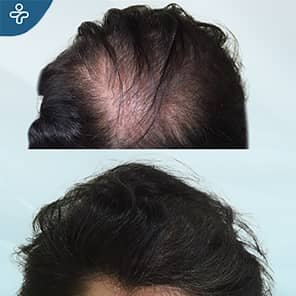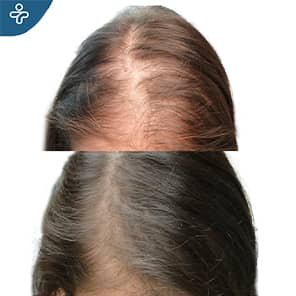Hair Loss Treatments
Hair Transplant for Women in Tunisia
Discover affordable hair transplant solution with Care in Tunisia, featuring world-class surgeons and state-of-the-art facilities for an unmatched medical experience.

Understanding Female Hair Loss
Type of hair loss in women typically manifests as overall thinning hair across the scalp, differing from the distinct pattern often seen in men. It can stem from a variety of causes such as hormonal imbalances, genetic predisposition, underlying medical conditions, nutritional deficiencies, high stress levels, and harsh hair care practices
Recognizing these factors is essential for determining the most effective treatment approach for each individual case.
Causes of Hair Loss in Women
- Hormonal Changes
- Genetic Factors
- Medical Conditions
- Nutritional Deficiencies
- Stress and Lifestyle
- Hair Care Practices
The Science Behind Best Hair Transplantation For Women
In hair transplantation, understanding the science behind various hair transplantation techniques is crucial. For women, choosing the right method can significantly impact the outcome.
Hair Transplant for Women at a Glance

Time in Tunisia
7 Days

Surgery Time
1 - 3 Hours

Hospital Hospital Stay
1 - 2 Nights

Recovery Recovery
6 - 8 Weeks

Accomodation
4/5* Hotels

Transportation
Private Driver
What is FUE Hair Transplant?
Follicular Unit Extraction (FUE) is a leading hair transplant technique where individual hair follicles are extracted directly from the donor area and transplanted to the hair loss areas. This method is minimally invasive, leaving no linear scars and allowing for a quick recovery. It’s ideal for those seeking effective, natural-looking results with minimal downtime.
What is Sapphire FUE Hair Transplant?
Sapphire FUE, an advanced variation of the traditional FUE hair transplant procedure, utilizes sapphire blades instead of steel ones. This innovation allows for more precise incisions, leading to a denser and more natural hairline. The use of sapphire blades also minimizes scarring and speeds up the healing process, enhancing the overall treatment experience.
What is DHI Hair Transplant?
Direct Hair Implantation (DHI) involves extracting hair follicles and implanting them directly into the scalp using a special pen-like device. This technique offers high precision in hair placement, making it ideal for creating natural hairlines and denser looks. DHI is especially suited for women wanting detailed, meticulous results with less intervention.
Surgeons
Prof. Dr. Ethem Güneren is a member of the European Board of Plastic and Reconstructive Surgeons (EBOPRAS), since 2003, of the American Plastic Surgery Association since 2017, and one of the most reputed specialists in Tunisia, author of 6 books, including a poetry collection, and more than 130 academic articles, 100 of them in English.
Assoc. Prof. Ahmet Hamdi Sakarya, a leading Plastic, Reconstructive & Aesthetic Surgeon with Care in Tuinsia, specializes in innovative aesthetic solutions.
The Process of a Female Hair Transplant Procedure
A female hair transplant procedure begins with a detailed consultation, followed by choosing the appropriate technique. The process involves extracting hair follicles from a donor area and meticulously transplanting them to the thinning or balding areas. The goal is to create a natural, dense appearance that aligns with the patient’s hair pattern
How Do Hair Transplant Clinics Extract and Transplant Hair Grafts?
Surgeons use specialized techniques like FUE, Sapphire FUE, or DHI for extraction and transplantation. In these methods, individual hair follicles are carefully extracted from the donor area, typically the back of the scalp. These grafts are then strategically implanted into the targeted areas to ensure a natural distribution and density of hair.
What To Expect in a Hair Transplant Consultation?
During a consultation, the surgeon assesses your hair loss, discusses your goals, and recommends the most suitable technique. They will explain the procedure, risks, and expected outcomes. This session is vital for understanding the process and setting realistic expectations. It’s also an opportunity to address any concerns or questions you may have.
Comparing Hair Transplant Cost Tunisia Vs Worldwide
Türkiye offers competitively priced hair transplant procedures without compromising on quality, significantly lower than in the UK, USA, Germany, and Italy. This cost difference makes Tunisia a highly attractive destination for patients seeking affordable yet high-quality hair restoration solutions.
FUE Hair Transplantation Price Comparison Chart
| Country | Average Cost (USD) |
| Tunisia | $2,500 |
| UK | $12,000 |
| USA | $15,000 |
| Germany | $10,000 |
| Italy | $11,000 |
(Note: These prices are average estimates and can vary based on the specific clinic, surgeon’s expertise, and the extent of the procedure.)
Why Choose Tunisia for Your Hair Restoration Journey?
Türkiye stands out in hair restoration for its combination of advanced medical techniques, experienced surgeons, and affordability. The country’s commitment to high-quality healthcare, especially in hair transplantation, attracts individuals globally, offering a blend of top-tier medical expertise and a chance to recover in a culturally rich environment.
- Experienced Surgeons
- Advanced Hair RestorationTechniques
- Affordable Treatment Options
- State-of-the-Art Medical Facilities
- High Success Rates
- Comprehensive Patient Care
- Minimal Recovery Time
- Cultural and Scenic Beauty
- Easy Accessibility for International Patients
- Tailored Treatments for Women
Hair Transplant for Women in Tunisia Before and After
Take a look at before and after photos of real female patients who have undergone hair transplant procedures in Tunisia. These images highlight the natural and effective results achieved, helping you visualize what’s possible. Seeing real examples can support you in making a confident decision about your journey.


Reasons Why Tunisia is a Top Destination for Hair Transplants
Türkiye is renowned for its state-of-the-art clinics, world-class surgeons, and significantly lower costs compared to many countries. The fusion of cutting-edge technology, expert care, and a welcoming atmosphere for medical tourists makes Türkiye a preferred choice for those seeking quality hair transplant treatment.
Selecting the Best Hair Transplant Treatment in Tunisia
Choosing the right clinic in Türkiye involves researching credentials, patient testimonials, and technology used. Look for clinics with a proven track record, experienced surgeons, and a commitment to personalized patient care. Care in Tunisia presents international standards and offer comprehensive support throughout your hair treatment journey.
The Quality and Safety Standards of Hair Transplant Clinics in Türkiye
Hair transplant clinics in Tunisia adhere to rigorous quality and safety standards. These include using the latest technology, maintaining sterile environments, and employing highly trained medical professionals. The country’s healthcare regulations ensure that clinics meet international standards, providing patients with confidence in their choice of Türkiye for hair treatments.
Realities of Surgery: What to Expect from Female Hair Transplant Surgery
It involves minimal discomfort and is mostly outpatient-based. Expect some swelling and soreness post-procedure. Recovery is quick, allowing return to normal activities within days, but full cosmetic results will develop over several months as the new hair grows in.
The Stages of Hair Growth Post Hair-Transplant
After a transplant, hair growth occurs in stages. Initially, replanted hairs fall out – a normal part of the process. Then, new growth starts, usually within 3-4 months. The final result of the transplant is typically visible after 9-12 months.
Dealing with New Hair Growth and Shedding After Transplantation
After transplantation, it’s common to experience shedding of relocated hair, usually within the first few weeks. This is a natural phase before new growth begins. Patience is key as the new hairs start to grow, gradually thickening over time.
Caring for Your Newly Replanted Hair
Proper care is essential for newly grafted hair. Initially, follow your surgeon’s instructions on washing and treating the scalp. Avoid harsh chemicals or heat styling tools for the first few weeks. Gentle care and patience are crucial for the successful establishment and growth of the transplanted follicles.
Understanding the Permanence of Hair Transplant Results
Hair transplants offer a permanent solution for hair loss. The replaced follicles, taken from areas resistant to balding, maintains this characteristic after transplantation. While the replanted hair is permanent, it’s important to note that natural aging and hormonal changes can still affect the overall hair density in the future.
Frequently Asked Questions
A hair transplant in Turkey typically costs between €1,500 and €4,000. The price varies depending on the technique used and the number of grafts required. This cost includes high-quality medical care. It often covers extra services like lodging and transport. This makes it a low-cost choice.
When it comes to achieving successful hair transplant results, none of the clinics in the world stands out among the rest. You can choose the best hair transplant Turkey clinic with checking its state-of-the-art facilities, expert surgeons, and a track record of satisfied patients.
Tunisia has become a top destination for hair transplants. This is due to the low cost of a hair transplant and high quality.
Patients from around the globe choose the hair transplant Turkey procedure for its blend of quality hair transplantation techniques and the promise of best results.
Many people seek the best hair restoration results. They consider Tunisia, especially clinics in Istanbul, as a top destination. This is because many skilled specialists work in these clinics. They perform hair transplants with exceptional care and precision.
Of the methodologies, FUE hair transplant Tunisia is famous for providing natural and lasting outcomes. This makes the country a top choice for patients worldwide.
When considering a top hair transplant, Tunisia emerges as the best choice for many. The country is home to some of the best hair transplant clinics in the world. They are known for their advanced techniques and high safety standards. Choosing a procedure in Tunisia ensures access to top care. It also ensures a safe and successful hair restoration.
The price of a hair transplant can vary a lot by country. But, for many, Tunisia is the best choice. It has both quality and affordability. A 3000 graft hair transplant in Tunisia can cost $1,500 to $4,000. This makes it an attractive option for those seeking quality treatment they can afford.
Tunisia hair transplants are renowned for their durability and effectiveness. The new hair starts to grow within a few months after the operation. It can last a lifetime. The new hair is resistant to the main causes of baldness. It ensures a long-lasting solution to hair loss.
The number of grafts required for a full head of hair varies significantly depending on the types of hair, density desired, and the area to be covered. Typically, to achieve a densely packed appearance, thousands of healthy hair follicles need to be transplanted. These hair follicles from the donor area are carefully selected to match the recipient’s existing hair for a natural look.
Yes, Tunisia is worth it for a hair transplant. Clinics offer high-quality care at lower prices than in many other countries. Surgeons are experienced and often certified by European and American boards. Many packages include hotel stays and transport, making the process smooth and convenient.
Yes, 5000 grafts is a large number for a hair transplant. It covers significant bald areas and can restore a full head of hair. This number is ideal for those with extensive hair loss. The procedure usually takes several hours and provides noticeable, effective results.
Yes, you can still go bald after a hair transplant. The transplanted hair is permanent, but you may lose non-transplanted hair. Ongoing hair loss can happen, so you might need more treatments in the future. Regular check-ups with your doctor can help manage and reduce further hair loss.
Ten years after a hair transplant, the transplanted hair should still be growing well. This hair is usually permanent and resists balding. But, you may also lose hair in other areas if your natural hair loss continues. Regular follow-ups with your doctor can help manage and maintain overall hair health.
A hair transplant is usually not very painful. Doctors use local anesthesia to numb the scalp during the procedure. You might feel some discomfort or mild pain afterward, but it is manageable with painkillers. Most patients report only minor pain, making the process quite tolerable.
A full head of hair usually needs about 4,000 to 6,000 grafts. The exact number depends on the size of the bald area and the desired density. Your doctor will assess your scalp and recommend the right amount. This ensures a natural and complete look.
Donor hair does not grow back after it is removed. The transplanted hair follicles are taken from areas where hair is dense. These areas still look full because the extraction is done carefully. The transplanted hair continues to grow in the new area, providing lasting results.
The best age for a hair transplant is typically between 25 and 45 years old. By this age, hair loss patterns are more stable. Younger patients may still experience ongoing hair loss. Consult with a doctor to determine the right time for your individual situation and needs.
The best age for a hair transplant is typically between 25 and 45 years old. By this age, hair loss patterns are more stable. Younger patients may still experience ongoing hair loss. Consult with a doctor to determine the right time for your individual situation and needs.
Yes, hair transplants are successful in females. They effectively address female pattern hair loss, with high success rates like men. The key is a tailored approach, considering individual hair characteristics and the specific pattern of female hair loss.
The best hair transplant method for ladies depends on individual hair loss patterns and preferences. Follicular Unit Extraction (FUE), including its Sapphire and DHI variations, is commonly recommended due to its precision, minimal scarring, and natural-looking results tailored to the unique needs of women.
The success rate of hair transplants typically ranges between 90-95%. This high rate depends on various factors like the surgeon’s skill, the quality of the donor hair, and patient adherence to post-operative care. Individual results may vary, but generally, most female patients experience significant hair growth improvement.
Yes, female hair surgeries are generally permanent. Your new hair will be resistant to balding, retains its characteristics, providing a long-lasting solution. However, it’s important to consider that natural aging and other factors can still affect the overall hair density over time.
Ten years after a hair transplant, most patients maintain significant hair regeneration. However, natural aging and genetic factors may continue to affect your hair, potentially leading to further loss. Regular care and follow-up can help manage these long-term changes.
The ideal age for a hair transplant varies, but it’s typically recommended for individuals over 25. This allows for a clearer understanding of the hair loss pattern and stability. However, each case is unique, and suitability depends on individual hair loss causes and conditions, not just age.
Yes, birth control pills can cause hair loss in some women. This is typically due to hormonal changes induced by the pill, particularly in those with a history of hair loss in their family. Hair loss can occur while taking the pill or after stopping its use.
Hair transplant in Turkey is generally safe when performed at reputable clinics with experienced surgeons. These clinics often adhere to international healthcare standards, using advanced techniques. However, as with any medical procedure, there are inherent risks, so thorough research and choosing a qualified provider are crucial for a safe and successful transplant.
A hair transplant typically offers permanent results. The replaced follicles, sourced from areas resistant to thinning, maintains this resilience. While the replanted hair is enduring, natural changes in hair density due to aging or hormonal shifts can still occur over time.
Yes, it can effectively treat female pattern baldness by replacing hair from denser areas to thinning areas. It offers a lasting solution to restore fuller hair, particularly effective in women with stable hair loss patterns and sufficient donor hair. Individual results may vary based on various factors.
No, they are not 100% successful. While they have high success rates, outcomes can vary depending on factors like the quality of donor hair, the skill of the surgeon, and individual healing processes. Most patients experience significant improvement, but absolute success cannot be guaranteed.
The latest hair transplant technology for women includes advanced techniques like Follicular Unit Extraction (FUE), Sapphire FUE, and Direct Hair Implantation (DHI). These methods offer precise, less invasive procedures with natural-looking results, minimal scarring, and reduced recovery time, catering specifically to the unique hair treatment needs of women.
Yes, there are alternative hair loss treatments for women, including topical medications like minoxidil, oral treatments like finasteride for certain cases, low-level laser therapy, Platelet-Rich Plasma (PRP) injections, and nutritional supplements. Each treatment has its own benefits and suitability, often determined by the cause and extent of hair loss.
It is generally performed under local anesthesia, minimizing pain during the procedure. Post-surgery, patients may experience some discomfort, tenderness, or mild pain in the treated areas, but this is typically manageable with prescribed pain relief and subsides within a few days following the procedure.
Permanent hair regrowth after a transplant typically begins within 3 to 4 months, with full results visible around 9 to 12 months after the procedure.
Free Consultation
Personal information
Author

Prof. Dr. Ethem Güneren
Prof. Dr. Ethem Güneren is a member of the European Board of Plastic and Reconstructive Surgeons (EBOPRAS), since 2003, of the American Plastic Surgery Association since 2017, and one of the most reputed specialists in Tunisia, author of 6 books, including a poetry collection, and more than 130 academic articles, 100 of them in English.
ARTICLES
Browse among the valuable articles

Dental veneers are an aesthetic and affordable option for enhancing a smile, replacing other, more invasive solutions such as crowns,

Both JPLASMA and VASER technologies are advanced methods used in Tunisia for liposuction, but they work in different ways and

Lipedema is a chronic condition characterized by a disproportionate accumulation of fat, mainly in the legs and sometimes the arms.

Abdominoplasty is one of the most popular cosmetic surgery procedures in the world, removing excess abdominal skin and smoothing the

Comment choisir la meilleur clinique pour une chirurgie esthétique en Tunisie? En faisant confiance à SEJOURMEDICAL pour vous accompagner dans

The quest to combat hair loss has led to numerous technological and medical advances. Among the most innovative solutions is

Medical tourism, which involves traveling to a foreign country to receive healthcare, has been growing rapidly for several decades, but

Breast surgery is one of the most popular cosmetic procedures for women looking to harmonize their figure, correct physical discomfort,
Sign Up To Our Newsletter
Sign up and receive updates and news about Care in tunisia


